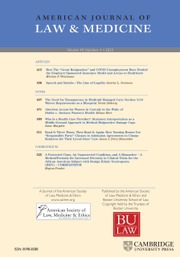Article contents
Bad Law, Bad Medicine
Published online by Cambridge University Press: 24 February 2021
Abstract
In this Comment, Dr. Altschule contends that in a variety of ways the American legal system currently is endangering the existence of positive physician-patient relationships, which are essential io the effective practice of medicine. First, he contends, physicians are exposed to an excessively high risk of liability for malpractice, and as a result must substitute the use of “defensive,” often unnecessary laboratory tests for reliance on their own sound medical judgment. Second, the confidentiality of communications between physicians and patients is receiving inadequate legal protection; therefore, patients often are hesitant to reveal aspects of their medical history that may be critical to their case. Third, the federal government, by its medically inappropriate attempts to ban drugs that do not meet certain federal “safe and effective” standards, and to ban food additives that fail to pass certain federally controlled tests aimed at determining whether the additive causes cancer, is making it increasingly difficult for physicians to prescribe substances that may be of great value to their patients. The author warns that our society's failure to substantially alleviate such problems is likely to lead to an inferior brand of medical practice.
- Type
- Articles
- Information
- Copyright
- Copyright © American Society of Law, Medicine and Ethics and Boston University 1977
References
1 For an early discussion of the physician-patient relationship as a social system, see Henderson, The Practice of Medicine as Applied Sociology, 51 TRANS. ASS'N AM. PHYS. 8 (1936).Google Scholar
2 F. W. PEABODY, DOCTOR AND PATIENT (1930).
3 Such regulations are promulgated pursuant, for example, to 21 U.S.C. § 355, which prohibits the introduction into interstate commerce of any new drug not approved by HEW as safe and effective.
4 See Connell, Government Regulation of Gastrointestinal Drugs Is Excessive, 12 DIGESTIVE DISEASES 720-23 (1977).Google Scholar
5 21 U.S.C. § 348(c)(3)(A).
6 Dulbecco, Report on a Discussion Meeting on the Biology of Chemical Carcinogenesis, 196 PROC. ROY. SOC'Y LONDON (B) 117 (1977).
7 See Wynder and Weisburger, Recommendations for Modifying Federal Statutes Relating to Environmental Carcinogens, 6 PREVENTIVE MED. 189-90 (1977).
8 Mann, Diet-Heart: End of an Era, 297 NEW ENG. J.MED. 644-50 (1977).
9 Id.
10 Miller, Kline, Rusch, and Baumann, The Effect of Certain Lipids on the Carcinogenicity of P-dimethylaminoazobenzene, 4 CANCER RES. 756 (1944); Miller, Kline, Rusch, and Baumann, The Carcinogenicity of P-dimethylaminoazobenzene in Diets Containing Hydrogenated Coconut Oil, 4 CANCER RES. 153(1944); Harman, Free Radical Theory of Aging: Effect of the Amount and Degree of Unsaturation of Dietary Fat on Mortality Rate, 26 J. GERONTOL. 451 (1971).
- 1
- Cited by


